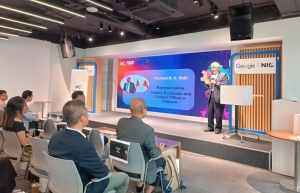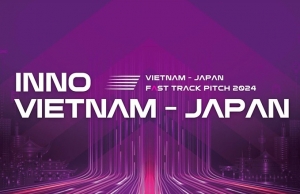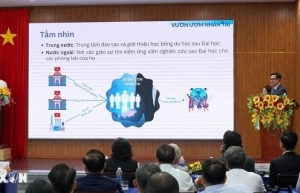Startup business models can be built centred on AI
 |
| Viable startups could be found if they address large market needs using AI, Photo: Shutterstock |
Marc Woo, managing director for Vietnam at Google Asia-Pacific, said that with its great potential, Vietnam’s digital economy is expected to grow 11-fold by 2030, reaching an astonishing $220 billion, equivalent to nearly half of Vietnam’s current GDP.
“AI is a key factor in realising this forecast. With a dynamic startup community and a tech-savvy youth making up 20 per cent of the total population, Vietnamese startups are well-positioned to capitalise on the AI opportunity,” Woo said at a conference at the National Convention Centre (NIC) organised on August 23 in Hanoi, aimed to unlock the power of generative AI by discussing the latest trends in AI adoption within enterprises.
The event featured prominent experts from Google Asia-Pacific, AI training and application pioneers AIVA Group, and the Vietnam Club of Faculties, Institutes, Schools, and Universities.
According to Google, the ongoing digital transformation trend, coupled with the region’s readiness for AI, suggests that Southeast Asia could reap economic benefits of up to $835 billion from AI by 2030.
Vu Quoc Huy, director of the NIC, stated that AI is not just a short-term trend but is gradually becoming a core element in the development strategy of many startups.
“In the future, AI is expected to continue changing the way businesses operate, from data management and process optimisation to the development of new products and services,” Huy said. “Keeping up with AI trends will be crucial to their survival and growth.”
Thye Yeow Bok, head of Startup Ecosystems for Southeast Asia, South Asia, and Greater China at Google Asia-Pacific, noted that when applying AI to startup projects, founders must be aware of the key challenges and potential solutions that could lead to success.
“The first challenge is identifying scalable use cases that not only fit the market but also have a clear path to profitability, which requires a deep understanding of users, careful experimentation, and a clear strategy,” Bok said. “In the world of AI, almost anything can be upgraded or transformed by it, from data analytics to recommendation systems. However, for startups, the key is to focus on building a viable and scalable business that addresses large market needs using AI,” said Bok who believes that costs are a significant barrier that could deter any startup.
“The second challenge is the relatively high development cost. It’s not just about expensive infrastructure. Hiring top AI talent and continuously improving your AI products also require significant financial commitment. These costs can strain cash flow and make it difficult to convince investors of the business’s potential,” Bok said. “Startups need to demonstrate that they can effectively use the capital they receive and have a clear plan to turn investment into profit.”
However, he pointed to the constantly changing nature of AI, suggesting that what is being built today may become obsolete in a few months or could be surpassed by competitors’ innovations. As a result, startups need an environment that allows them to quickly experiment and adapt to market changes, which is essential for maintaining competitiveness in a rapidly evolving field.
Though the challenges are considerable, startups are not alone on this journey, as the Vietnamese market is receiving significant support from the government and domestic corporations like Viettel and Vingroup.
Huy of the NIC noted, “The Vietnamese government has been introducing various policies to encourage startups and investment in technology. This creates better conditions for Vietnamese AI businesses to grow and compete in the international market.”
Moreover, based on experiences in AI development worldwide, Google believes there is an additional policy that the Vietnamese government should consider, ensuring that businesses can fully leverage AI for growth. It suggests that Vietnam open cross-border data flows to unlock the necessary data for AI research and development in Vietnam and for providing AI services. Allowing access to a larger volume and diversity of global data, beyond national borders, improves AI performance and accuracy, it said.
According to the Organisation for Economic Co-operation and Development, cross-border data flows are particularly important for small- and medium-sized enterprises, enabling them to efficiently access critical knowledge and information to compete with larger organisations. At the national level, data access and sharing across borders may generate social and economic benefits up to 2.5 per cent of GDP.
 | Innovative solutions bridge startup ecosystem between Taiwan and Vietnam Startup Island Taiwan, the territory's startup brand, led 18 innovative startups to co-host the Taiwan Tech Solution Day at the National Innovation Centre (NIC) in Hanoi on August 13. |
 | Japan’s deep-tech startups to make waves in Vietnam Despite being in a fledgling state, more Vietnamese deep-tech startups are looking for Japanese funding and backing to scale up their operations. |
 | Da Nang, RoK's Seoul fortify startup community connections A scientific workshop titled "Connecting Innovation Spaces: Da Nang - Seoul" was held in the central beach city of Da Nang on August 29. |
What the stars mean:
★ Poor ★ ★ Promising ★★★ Good ★★★★ Very good ★★★★★ Exceptional
 Tag:
Tag:
Related Contents
Latest News
More News
- State corporations poised to drive 2026 growth (February 03, 2026 | 13:58)
- Why high-tech talent will define Vietnam’s growth (February 02, 2026 | 10:47)
- FMCG resilience amid varying storms (February 02, 2026 | 10:00)
- Customs reforms strengthen business confidence, support trade growth (February 01, 2026 | 08:20)
- Vietnam and US to launch sixth trade negotiation round (January 30, 2026 | 15:19)
- Digital publishing emerges as key growth driver in Vietnam (January 30, 2026 | 10:59)
- EVN signs key contract for Tri An hydropower expansion (January 30, 2026 | 10:57)
- Vietnam to lead trade growth in ASEAN (January 29, 2026 | 15:08)
- Carlsberg Vietnam delivers Lunar New Year support in central region (January 28, 2026 | 17:19)
- TikTok penalised $35,000 in Vietnam for consumer protection violations (January 28, 2026 | 17:15)






















 Mobile Version
Mobile Version